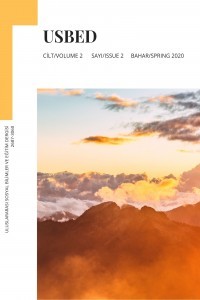A thematic analysis of YouTube comments on 2020 Turkish–Greek border crisis: The case of Euronews
AB, Türkiye, Mülteci, Göçmen, Tematik Analiz, 2020 Türk-Yunan Sınır Krizi
A thematic analysis of YouTube comments on 2020 Turkish–Greek border crisis: The case of Euronews
EU, Turkey, Refugee, Migrant, Thematic Analysis, 2020 Turkey-Greece Border Crisis,
___
- Agencies, D. S. with. (2020, March 27). Migrants end wait at Turkey-Greece border for Europe. Daily Sabah. https://www.dailysabah.com/politics/migrants-end-wait-at-turkey-greece-border-for-europe/news
- Asghar, M. Z., Ahmad, S., Marwat, A., & Kundi, F. M. (2015). Sentiment Analysis on YouTube: A Brief Survey (arXiv:1511.09142). arXiv. http://arxiv.org/abs/1511.09142
- BBC. (2020). Greece suspends asylum applications as migrants seek to leave Turkey—BBC News. https://www.bbc.com/news/world-europe-51695468
- Communication From the Commission to the European Parliament, The Council, The European Economic and Social Committee and the Committee of the Regions a European Agenda on Migration, (2015). https://eur-lex.europa.eu/legal-content/EN/TXT/?qid=1485255362454&uri=CELEX:52015DC0240
- Connor, P. (2016). Number of Refugees to Europe Surges to Record 1.3 million in 2015. Pew Research Center’s Global Attitudes Project. https://www.pewresearch.org/global/2016/08/02/number-of-refugees-to-europe-surges-to-record-1-3-million-in-2015/
- Cortinovis, R. (2021). Pushbacks and lack of accountability at the Greek-Turkish borders.
- European Council on Refugees and Exiles (ECRE) |. (2022). https://ecre.org/
- EU-Turkey statement, 18 March 2016. (2016). https://www.consilium.europa.eu/en/press/press-releases/2016/03/18/eu-turkey-statement/
- Fact Check: Did the EU-Turkey Deal Bring Down the Number of Migrants and of Border Deaths? (2016). https://blogs.law.ox.ac.uk/research-subject-groups/centre-criminology/centreborder-criminologies/blog/2016/09/fact-check-did-eu
- Fargues, P., & Fandrich, C. (2012). The European response to the Syrian refugee crisis: What next? Greece has ‘no right’ to suspend asylum applications, UN. (2020, March 3). InfoMigrants. https://www.infomigrants.net/en/post/23142/greece-has-no-right-to-suspend-asylum-applications-un
- Greenhill, K. M. (2016). Open arms behind barred doors: Fear, hypocrisy and policy schizophrenia in the European migration crisis. European Law Journal, 22(3), 317–332.
- How is the migrant crisis dividing EU countries? - BBC News. (2016). https://www.bbc.com/news/world-europe-34278886
- İçduygu, A., & Aksel, D. B. (2014). Two-to-tango in migration diplomacy: Negotiating readmission agreement between the EU and Turkey. European Journal of Migration and Law, 16(3), 337–363.
- Interview of Prime Minister Kyriakos Mitsotakis on CNN TV station and journalist Richard Quest | Ο Πρωθυπουργός της Ελληνικής Δημοκρατίας. (2020). https://primeminister.gr/en/2020/03/06/23497
- ISIS militants seize towns in Syria’s Aleppo province. (2014, August 13). France 24. https://www.france24.com/en/20140813-isis-militants-seize-towns-syrias-aleppo-province
- Jamieson, A. (2020). Refugees reach Greek border as EU demands Turkey uphold commitments. Euronews. https://www.euronews.com/2020/02/27/at-least-22-turkish-soliders-killed-in-syria-airstrike
- Kirişci, K. (2014). Syrian refugees and Turkey’s challenges: Going beyond hospitality. Brookings Washington, DC.
- Nestoras, A. (2015). The view from Europe’s borders: Greece and the CSDP as a security provider. In The Common Security and Defence Policy: National Perspectives (pp. 61–84). Academia Press.
- Özoflu, M. A., & Kahraman, S. (2019). Rethinking European integration process in the light of crises introduction. Köz-Gazdaság-Review of Economic Theory and Policy, 14(1), 53–67.
- Oztig, L. I. (2020). The Turkish–Greek Border Crisis and COVID-19. Borders in Globalization Review, 2(1), 78–81. https://doi.org/10.18357/bigr21202019843
- Parliament, E. (2020). Proposals to extend the list of EU crimes to all forms of hate crime and hate speech I Legislative Train Schedule. European Parliament. https://www.europarl.europa.eu/legislative-train/theme-a-new-push-for-european-democracy/file-hate-crimes-and-hate-speech
- Press corner | European Commission. (2020). https://ec.europa.eu/commission/presscorner/detail/en/statement_20_380
- Shanahan, M. K. (2017). Journalism, online comments, and the future of public discourse. Routledge.
- Spijkerboer, T. (2016). Europe’s refugee crisis: A perfect storm. Border Criminologies, 10.
- UNHCR. (2022). Syria emergency. UNHCR. https://www.unhcr.org/syria-emergency.html
- UNHCR - UNHCR statement on the situation at the Turkey-EU border. (2020). Retrieved 2 January 2023, from https://www.unhcr.org/news/press/2020/3/5e5d08ad4/unhcr-statement-situation-turkey-eu-border.html
- What Happened at the Greece-Turkey Border in early 2020? (2020). Verfassungsblog. https://verfassungsblog.de/what-happened-at-the-greece-turkey-border-in-early-2020/
- Başlangıç: 2019
- Yayıncı: Aytekin DEMİRCİOĞLU
Workplace Aggression and Violence
Viral pazarlama: Avantajları, zorlukları ve stratejileri üzerine kavramsal bir çerçeve
Interaction and development of university and society through the prism of social responsibility
Volodymyr RYABCHENKO, Kateryna TRYMA
Impacts of COVID-19 on unemployment: Bangladesh perspectives
Md Ikhtiar Uddin BHUİYAN, Md Meshkat MOLLİK, Most. Arafat Jahan TULY
Post-truth dönemde sosyal medya ile yerinden edilen gerçeklik ve hakikat
Orhan KAYA, Şeyma KAYA, Muhammed Emin SOYDAN
Tarih öncesinden gelen bir zanaat: Kastamonu’da geleneksel Küçüksu Caba üretimi
The importance of aviation safety in terms of human resources management in air cargo transportation
A thematic analysis of YouTube comments on 2020 Turkish–Greek border crisis: The case of Euronews
